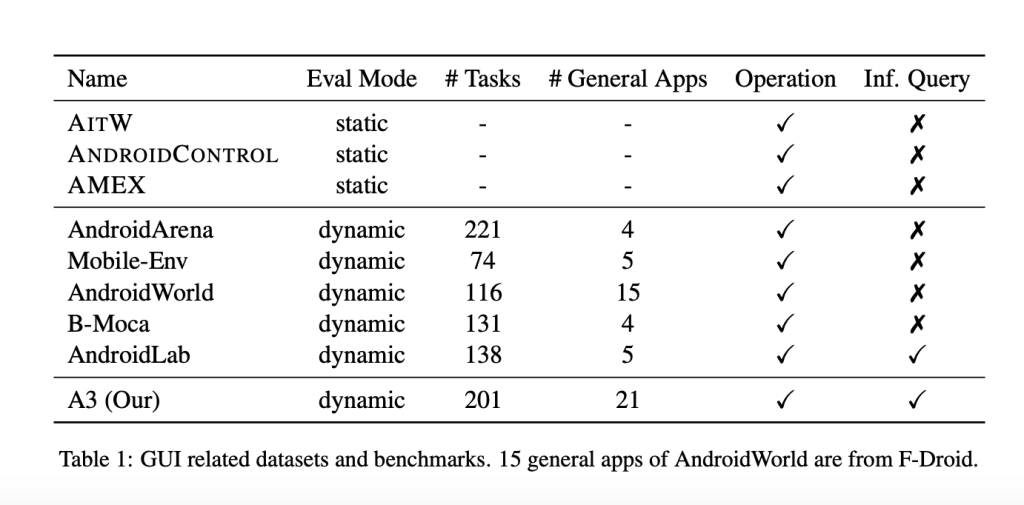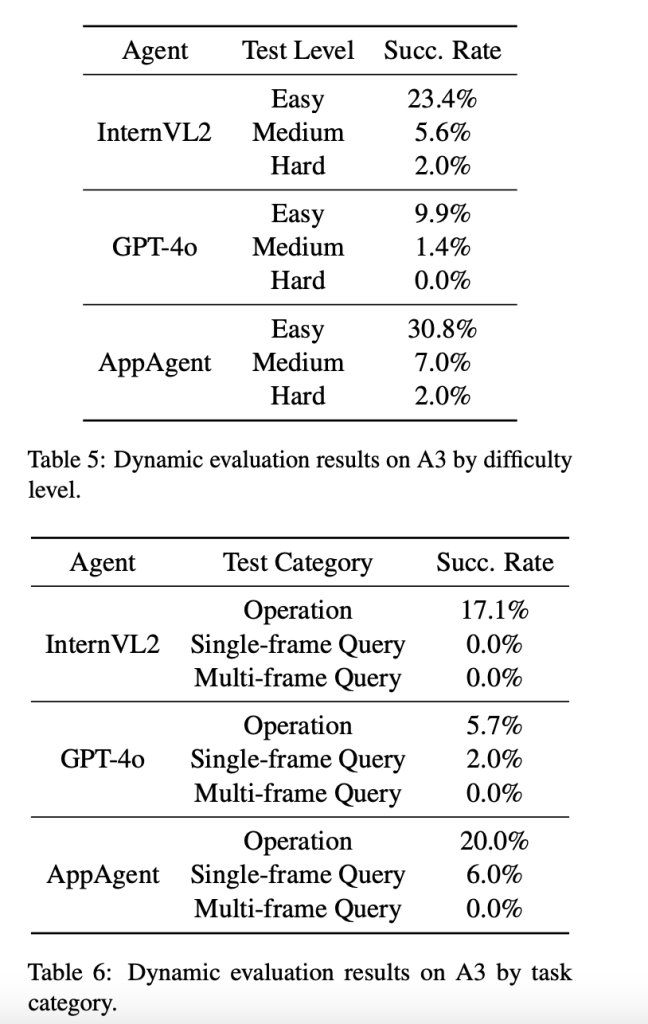The development of large language models (LLM) has significantly advanced artificial intelligence (ai) in several fields. Among these advances, mobile GUI agents (designed to autonomously perform tasks on smartphones) show considerable potential. However, evaluating these agents poses notable challenges. Current datasets and benchmarks are often based on static framework evaluations, which provide snapshots of application interfaces for agents to predict the next action. This method fails to simulate the dynamic and interactive nature of real-world mobile tasks, creating a gap between tested capabilities and actual performance. Furthermore, existing platforms tend to restrict application diversity, task complexity, and real-time interaction, underscoring the need for a more comprehensive evaluation framework.
In response to these challenges, researchers from CUHK, vivo ai Lab, and Shanghai Jiao Tong University have introduced Android Agent Arena (A3), a platform designed to improve the evaluation of mobile GUI agents. A3 provides a dynamic assessment environment with tasks that reflect real-world scenarios. The platform integrates 21 commonly used third-party applications and includes 201 tasks ranging from retrieving online information to completing multi-step operations. Additionally, A3 incorporates an automated assessment system that leverages enterprise-grade LLMs, reducing the need for manual intervention and coding expertise. This approach aims to bridge the gap between research-driven development and practical applications for mobile agents.
Key features and benefits of the A3
A3 is based on the Appium framework, facilitating seamless interaction between GUI agents and Android devices. It supports a wide action space, ensuring compatibility with agents trained on diverse data sets. The tasks are classified into three types (operational tasks, single-frame queries, and multi-frame queries) and are divided into three levels of difficulty. This variety allows for a comprehensive assessment of an agent's capabilities, from basic navigation to complex decision making.
The platform's assessment mechanism includes task-specific features and an enterprise-level LLM assessment process. Task-specific functions use predefined criteria to measure performance, while the LLM assessment process employs models such as GPT-4o and Gemini for autonomous assessment. This combination ensures accurate evaluations and scalability for an increasing number of tasks.

Insights from initial testing
The researchers tested several agents on A3, including optimized models and enterprise-level LLM, and returned the following insights:
- Challenges in dynamic assessments: Although the agents performed well in the static evaluations, they faced difficulties in the dynamic environment of A3. For example, tasks requiring multi-frame queries often resulted in low success rates, highlighting the challenges of real-world scenarios.
- Role of LLMs in assessment: The LLM-based evaluation achieved an accuracy of 80% to 84%, and cross-validation significantly reduced errors. However, complex tasks sometimes required human supervision to ensure accuracy.
- Common mistakes: Observed errors included incorrect click coordinates, redundant actions, and autocorrect difficulties. These issues underscore the need for agents capable of adaptive learning and understanding of context.

Conclusion
Android Agent Arena (A3) provides a valuable framework for evaluating mobile GUI agents. By providing a diverse set of tasks, a large action space, and automated assessment systems, A3 addresses many limitations of existing benchmarks. The platform represents a step forward in aligning research advances with practical applications, enabling the development of more capable and reliable ai agents. As ai continues to evolve, A3 lays a solid foundation for future innovations in mobile agent evaluation.
Verify he Paper and Project page. All credit for this research goes to the researchers of this project. Also, don't forget to follow us on <a target="_blank" href="https://twitter.com/Marktechpost”>twitter and join our Telegram channel and LinkedIn Grabove. Don't forget to join our SubReddit over 60,000 ml.
UPCOMING FREE ai WEBINAR (JANUARY 15, 2025): <a target="_blank" href="https://info.gretel.ai/boost-llm-accuracy-with-sd-and-evaluation-intelligence?utm_source=marktechpost&utm_medium=newsletter&utm_campaign=202501_gretel_galileo_webinar”>Increase LLM Accuracy with Synthetic Data and Assessment Intelligence–<a target="_blank" href="https://info.gretel.ai/boost-llm-accuracy-with-sd-and-evaluation-intelligence?utm_source=marktechpost&utm_medium=newsletter&utm_campaign=202501_gretel_galileo_webinar”>Join this webinar to learn actionable insights to improve LLM model performance and accuracy while protecting data privacy..
Asif Razzaq is the CEO of Marktechpost Media Inc.. As a visionary entrepreneur and engineer, Asif is committed to harnessing the potential of artificial intelligence for social good. Their most recent endeavor is the launch of an ai media platform, Marktechpost, which stands out for its in-depth coverage of machine learning and deep learning news that is technically sound and easily understandable to a wide audience. The platform has more than 2 million monthly visits, which illustrates its popularity among the public.
<script async src="//platform.twitter.com/widgets.js” charset=”utf-8″>
 NEWSLETTER
NEWSLETTER





